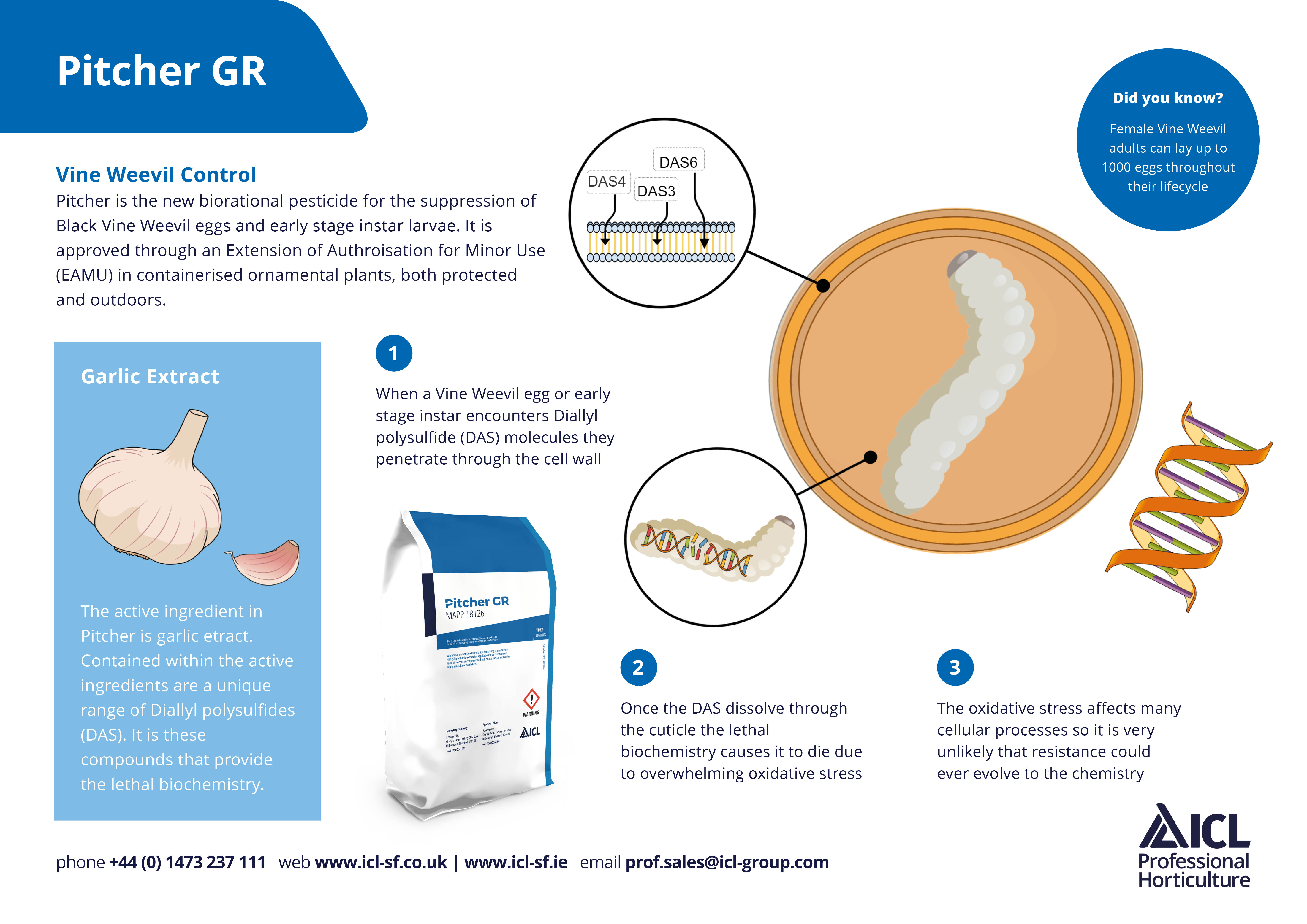Leading forestry nursery committed to nematodes
Black vine weevil (Otiorhynchys sulcatus) is a pest that strikes fear into the hearts of most nurserymen. While some growers already successfully deploy beneficial nematodes to control these evil weevils, many are reliant on the Exemptor (thiacloprid) – the systemic season long control. A worthy match for this most challenging adversary, Exemptor is soon to be lost from the industry.
“With sales of ‘straight’ Exemptor banned from 3 August 2020, and deliveries ‘ready incorporated’ in growing media to stop from 6 January 2021, growers need to embrace the biological alternatives,” says ICL’s Martin Donnelly. “Using beneficial nematodes requires a different approach. Used correctly, these tiny natural enemies are highly effective. However, growers should aim to optimise performance by paying special attention to factors such as soil/growing media temperature. To help them make informed decisions, we are setting up a network of temperature probes and data loggers. There is also a timely new tool in the IPM armoury – the biorational Pitcher, which targets eggs and early instar larvae.
Maelor committed to nematodes
Maelor Forest Nurseries produces 30million trees a year on 480 acres at Bronington, near Wrexham. Supplying commercial forestry and native broadleaf species as bare root trees, production is predominantly open field, with some protected propagation. The nursery has remained committed to nematodes (and Met52 – soon to be discontinued) for approaching a decade.
“The key is to break the vine weevil lifecycle,” explains Maelor’s Production Director, Imam Sayyed. “In outdoor production the vine weevil lifecycle can be fairly accurately predicted. However, under protection, it is more complicated as any stage – egg, larva, pupa or adult - is possible at any time of the year. As such, careful monitoring is essential.
“When using nematodes, it is very important to know the accurate soil temperature. While we already had our own weather stations, ICL’s temperature probe and data logger is proving a useful tool. When applying nematodes in fields it’s important to find the correct window – with the right soil temperature and moisture levels.
“With accurate weather data, we know exactly when we can safely switch from cold tolerant, to the more cost-effective Vine Weevil Seeka.
“Using nematodes really does require a different mindset,” says Imam. “Unlike conventional crop protection chemicals, these are living organisms. As soon as they arrive on site, they need to be stored correctly in a fridge - at a temperature of 4-5C.
“Quality checking is crucial; before we apply, we take a sample from each pack, to check the nematodes are alive. Care needs to be taken to apply them properly - nematodes require plenty of attention to detail.
“Nematodes have become, very much, a part of our overall IPM strategy - we find they work well.”
For more information on Seeka Nematodes CLICK HERE>>>
New biorational pesticide
“Committed to helping the industry tackle this potentially devastating pest, we offer a one-stop-shop for vine weevil control,” explains ICL’s Martin Donnelly. “The latest addition is Pitcher GR, a new biorational for the suppression of vine weevil eggs and early instar larval stages.”
Based on a stabilized from of garlic extract, when applied to growing media the active substance – Diallyl polysulphide – shows efficacy on vine weevil eggs and early instar larval stages. Dissolving through the cuticle, it starts a cascade chain reaction causing the egg or instar to die due to overwhelming oxidative stress.
“Pitcher is recommended for use in conjunction with beneficial nematodes in an integrated pest management (IPM) programme,” explains Martin. “After using Pitcher GR, it is important to wait a minimum of six weeks before making a second application or applying beneficial nematodes.
“Unaffected by temperature fluctuations, there are no resistance issues, no re-entry limitations following treatments and Pitcher GR has very low impact on non-target organisms and the environment.
“Unlike conventional chemical products, IPM solutions provide long term sustainable solutions for the industry to tackle this most challenging of pests.”
For more information on Pitcher GR CLICK HERE>>>

